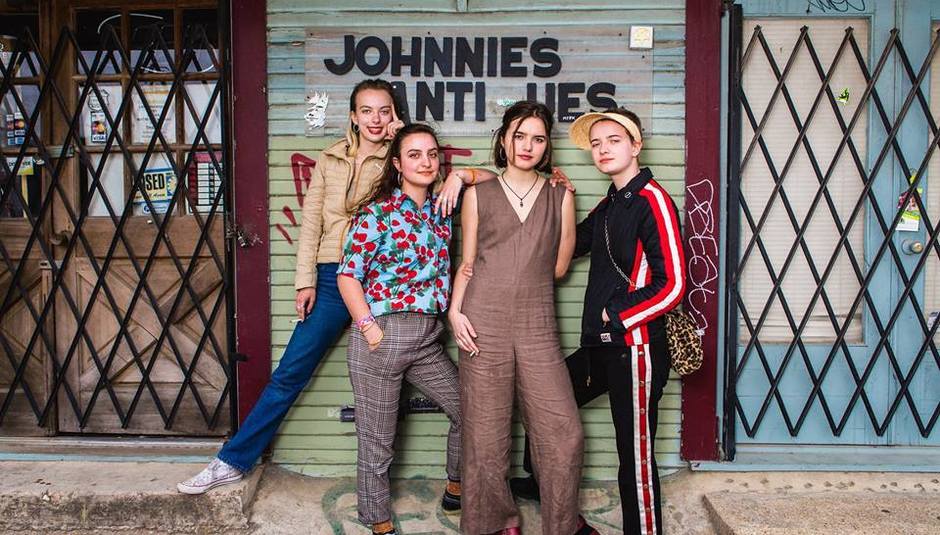If anyone tells you 2018 hasn't been a vintage year for music they're wrong. Particularly here in the UK, there's been a resurgence in acts who've built their way up from grassroots level to secure a place in the nation's psyche, and one of the most prominent bands to make an impact this year are Goat Girl. Having already amassed a growing legion of fans thanks to a string of incendiary live shows up and down the land, the South London based four-piece can also lay claim to having released one of this year's finest debuts. Their self-titled album reads like an autobiographical document of Goat Girl's world and everything that surrounds it, whether good or bad. The four-piece - Lottie (vocals & guitar), Ellie (guitar & vocals), Naima (bass & vocals), and Rosy (drums) - only formed in 2016, but having signed to Rough Trade soon after, put out a handful of well-received singles culminating in the March release of their excellent debut..
DiS caught up with them recently at the tail end of a long summer of festivals. However, with a UK headline tour coming up later this month, there's little time to be resting on their laurels.
DiS: The first time I saw Goat Girl was at Eurosonic Noorderslag in 2017 and you initially reminded me of C86 bands like The Shop Assistants and Talulah Gosh but with lo-fi, countrified twist. Were you influenced by any of those bands from the outset?
Lottie: Definitely. A lot of our influences come from that era. Lots of post-punk, but then I'm also a big fan of the nineties.
Naima: We all like different things. I'm more into punk.
Your debut album's received a wealth of critical acclaim since it came out, not least because of the autobiographical nature of many songs on the record. 'Creep' for example.
Lottie: That's a true story. I think this guy was filming my breasts. We were going through a tunnel and obviously, the windows reflect when it's dark outside which I think he completely forgot about. So I could see the reflection in the window. It was really annoying. I think women feel they can't say things a lot of the time and I don't believe they should have to put up with stuff like that.
Ellie: Sometimes you think it's easier to not say anything and then it makes you feel like shit when you don't.
Naima: But it can also make you feel like shit if you do say something because some people actually get a rush from that.
Rosy: The best way to deal with catcalling is to say, "You want a fuck then? Come on!" Make them freak out.
Lottie: They just love the power of "I own your body". If you just tell them to fuck off they love that, because then they know they've intimidated you.
How did you arrive at the final tracklisting for the album?
Lottie: We actually came up with it on a plane! We always had an idea of how we wanted the album to flow. We play most of the songs in the same order live. I think we worked out that was how people's emotions drop and then rise again. I get bored quite a lot, and I wouldn't want that boredom to transcend onto the audience at our gigs. So because I like to be stimulated all the time, I want them to be stimulated too. We tried to reflect that with the album as well.
Ellie: It's always good to remember how you feel about something when you listen to it or see it. We did all the artwork ourselves as well.
Goat Girl have quite a DIY approach compared to a lot of other bands. Do you think it's important for artists should retain as much control over their work as they possibly can?
Rosy: Not really. I don't think we're that DIY at all. I think that's an insult to people who are truly DIY and literally do everything themselves. Our lives are paid for by our label. We haven't forgotten where we came from or how we grew, and it was all quite innocent, but I feel DIY just means it's a hobby or predominantly lo-fi music you're creating. That's what I think we were and we grew from. It still has that sound to it but I think that's more of a sonic thing than the whole project being DIY. We've had a lot of help.
Naima: But we've had a lot of help with everything outside of the songs. All of the music and artistic elements were created by us. Everything comes from our world and in that sense it's DIY.
Do you think being based in London makes a big difference for a band like yourselves to become established?
Naima: Definitely.
Lottie: There's a lot of attention placed on this so-called South London scene which is great but it's also bullshit. There are so many scenes existing around London right now. The South London scene is just about one venue. There are so many people making great music yet everything gets directed at this one place when there's so much happening around.
Rosy: It's just lazy journalism. It's so easy to just pigeonhole everyone into one scene. But there are people from all over making great music in London at present.
Lottie: I just wish it had a different name and was allowed to exist on its own terms without being commodified into one scene. None of the bands sound alike. I think we're all linked in terms of being friends - we play gigs together and help each other out. At the end of the day it's just a friendship that exists rather than a particular sound. Musically it's so diverse, and that's also the most exciting thing about it. The word "scene" suggests we're following a trend and I wouldn't say that's necessarily the case.
Rosy: We're all kindred spirits.
Have you started working on the follow up to your debut? Are there any new songs in the live set at the moment?
Lottie: We have. It's going to be a bit different to the first album. A lot of the songs are quite old.
Ellie: Lottie wrote a lot of them when she was about 13.
Lottie: Maybe a bit older than that. I quite like that because it's from the age when you were most passionate about certain catastrophes that may have happened in your life. You're so much more involved with that issue.
Ellie: When you were younger you have that naivety where you believe you can change the world and make a difference which I think we still have as a band. But on a personal level, I've given up on that idea.
Lottie: We've just grown up a lot.
Ellie: I still feel those things. It's so important to remain personal in everything you do. You don't necessarily have to go overboard with it but at the same time it's important to spread that view if you've got a platform.
Rosy: Just empowering young women is enough for me. We got so many kids at our gigs who are really touched by seeing four women on stage. It's really gratifying.
Do you think The PRS Foundation's Keychange initiative will achieve what it's set out to do by 2022 in terms of gender imbalance on festival bills? That we're still talking about this now is a sad indictment in itself.
Lottie: It's crazy. I think we've always existed in a place where gender's never been seen as an issue. We grew up playing in safe spaces with other like-minded people. It was never a case of, "Oh you're four girls in a band." Obviously, this exists in wider areas of the music scene otherwise we wouldn't still be discussing it. Music in general is still controlled by old, white men, and I don't understand how it's still going on. I've just been finding out about these amazing female Gregorian composers from the 1800s that were overlooked at the time. They had no chance at all and yet 200 years later this kind of thing is still going on. How have people not moved past that yet?
Ellie: At the same time it is nice to celebrate some of our differences. It can be difficult when the subject arises and people don't know whether to talk about us as a female band or not.
Lottie: I'm not sure I enjoy that question.
Ellie: I enjoy it because I have a lot to say about it. When people play us on the radio and announce us as an all-girl group, as if it's something to be surprised about. It's so patronising, and it's used as a selling point.
Lottie: It's ridiculous we're still having these conversations.
I'd describe you as a punk band. Nothing more, nothing less.
Ellie: Really. Oh, that means a lot.
Social inequality and austerity often leads to great art and creativity. Do you think that's been pivotal in underground music of late? Does the political and social climate inform a lot of what you write about?
Ellie: Definitely. Artists will always want to have a say about what's going on around them. It's so important for that to exist and get a perspective from a non-political person.
Lottie: We don't actually have any idea about politics. We don't know what we're talking about. I feel like you almost learn as you say it out loud. We live in a century of self and only care about our own views. So saying them out loud and discussing them with each other makes everything more understandable to ourselves to the point where I now get what I'm talking about. What I'm saying is actually valid. Learning about other people's views you might not necessarily agree with and learning where they come from then maybe getting an inkling how you can change that without hating someone. I just wished people would research things more. It's almost as if the people in power don't want us to be educated, and want us to exist like zombies. It's a way to distract people, the left and the right fighting against each other when in reality they probably have quite similar views. They all want the same things in life.
Rosy: It's almost like Brexit was perfectly planned to exist at the same time as Donald Trump's brain so we can become a tax haven for people because we're not part of Europe any more. A lot of recent political happenings are just there to distract people from the root cause which is the conditioning of politics and why it's happening in the first place. Putting it all down to one person yet where did it grow from?
Lottie: People that write for newspapers can just say whatever they want to. To them, freedom of speech just means they can make up whatever they want. That's the scary thing. People believe it when they read it.
Ellie: But then I guess we believe what we want to as well. Good stuff about Corbyn and bad stuff about Trump.
Naima: You've got to keep an open mind on both sides.
Ellie: I sometimes don't understand why they both exist.
What advice would you give to a new band that's just starting out?
Lottie: Stick to your guns. Don't let people control you.
Ellie: Don't get caught up in thinking you're the best band in the world.
Naima: Don't worry about what other people think.
Lottie: If you're enjoying what you're doing you won't think about the careerist perspective of it. That comes naturally if it does and if it doesn't, it doesn't. All that matters is you're enjoying making music you love.
Are there any new bands or artists you'd recommend for Drowned In Sound and its readers to check out?
Lottie: I like Gentle Stranger. Squid are another really great band.
Ellie: Milk Disco are really good. Jockstrap too.
Goat Girl is out now via Rough Trade Records. For more information about Goat Girl, including forthcoming tour dates, please visit their official website.






















